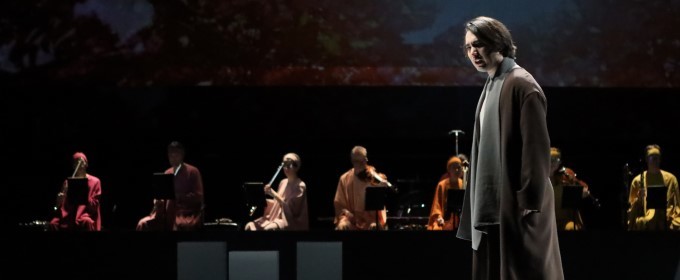Review: EN SILENCE at Grand Théâtre

On the 26th and 27th of February, the Grand Théâtre of Luxembourg was proud to present En Silence, an opera by Alexandre Desplat and Solrey. After a great novelist (Sava Lolov) suffers a stroke, he is left partially paralysed and almost incapable of expressing himself. Mita (Mikhail Timoshenko) is a young writer who idolizes his old master, and who decides to pay him a visit at his house. There he finds Tomiko (Camille Poul), the old man's daughter, who is determined to stand by her father, even though his complete lack of interaction leaves her in a state of pure distress. The play has a couple of side stories that contribute greatly to the narrative progression and to the reflection we are invited to make about the ways we (choose to) manage our own voice and to cope with the silence of those around us.
This play has quite a bit to unpack, but we will try to be brief. Lolov stands out as a remarkably prolific artist, acting not only as the author, but as a variety of other characters as well. Most of his lines are delivered as the narrator, always with an impressive strength. He sets the tone of many scenes, perhaps even of the entire play, bringing the audience's attention to not only a story, but also to a set of feelings and mindsets. Throughout the narrative, his characters never sing any of their lines, a crucial difference between them and those played by Timoshenko and Poul.
Indeed, Timoshenko's first intervention made us wonder if mixing singing and non-singing characters made perfect sense. His operatic voice was flawless, as was Lolov's delivery, but that particular mix in the cab felt slightly forced. This is not to say, however, that it did not always work. In fact, the scene when Mita loses his temper in front of his master is, in our opinion, one of the best theatrical moments we have seen recently, with one's operatic power and the other's strong narrative emphasis clashing masterfully. Overall, Timoshenko's Mita was a very interesting character to watch. His mannerisms and early interventions make him seem a bit one dimensional at first, but the development of the character really allowed the actor to shine and show us what the young writer was all about.
This contrasted with Poul's Tomiko, who allowed the actress to present a greater range of emotions from earlier moments of the play. While also a remarkable singer, the demands of the character forced her to exhibit a strong balance between feeling and vocal strength from the very beginning. All of her lines were delivered with the exact emotion Tomiko was supposed to experience during every particular interaction.

As for the scenery, it took a minute or two to grow on you. But that is really all it took. At the beginning of the first scene you feel like you are looking at something as simple and plain as an IKEA catalogue, but after the narrator starts his monologue, you are slowly immersed in a very well-defined Japanese atmosphere. Lolov certainly contributes for this, with his outfit and martial movements, but it is the band that really establishes and maintains the Nipponic tone. The music was brilliant in itself, but the band could not have played it better, with a cadence that was always ready to reinforce the emotion of every scene. Their interventions in moments of silence were crucial, given the main topic of this play, and the constant presence of the musicians on stage, lined up in the background like observing entities, was not only aesthetical but also very symbolic. For all these reasons, something as simple as a white stage with very few elements and props suddenly brought us to a Japanese house, where even slowly sliding panels resembled Asian folding screens.
The only suggestion we would like to make is actually a very generic one, and is directed at no author or director in particular. We know it feels only natural to write about human condition through the lens of our own experience. But is it not perhaps time to stop writing about writers? There are so many ways to reflect on the wonders and flaws of humanity, yet it seems like there is a disproportionate amount of works dedicated to the struggles of artists. Philosophical pain, doubt and fear are all too common, and in no way exclusive of those who actually bother to put them in writing. This is obviously no direct critic to the great Alexandre Desplat, whose work we could not admire more. Just something to think about.
Many thanks to everyone involved in this production and, once again, to the Grand Théâtre, for bringing to the Grand Duchy such talented artists.
Image credit: Silvia Delmedico
Reader Reviews
Videos

